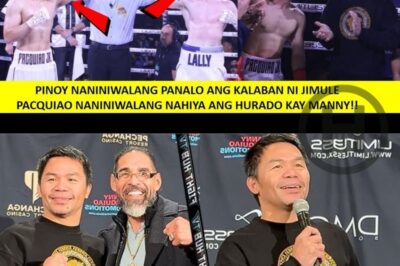When Interview Tension Turns Emotional: Alma Moreno and Karen Davila’s Viral Exchange Explained With Context and Respect
Introduction
A past televised interview between veteran actress and politician Alma Moreno and broadcast journalist Karen Davila resurfaced online recently, reigniting discussion about professionalism, media ethics, and the challenges faced by public officials during high-pressure interviews.
Clips from the exchange went viral on multiple social media platforms, with headlines suggesting that Alma was “embarrassed” or “brought to tears” during the interview. But what really happened? Was it an act of humiliation, or a moment of genuine miscommunication under the intense pressure of public service scrutiny?
This article breaks down the events objectively, highlighting key moments, the social context, and the long-term impact of that televised conversation.
I. The Interview: Background and Setting
The interview in question occurred during a segment of “Headstart”, Karen Davila’s morning news and public affairs program. The guest was Alma Moreno, who at the time was running for a national position in the Senate.
Karen, known for her direct and incisive interview style, asked policy-related questions to gauge Alma’s platform and readiness for office. Alma, a seasoned celebrity and councilor at that point, was stepping into a much more demanding political arena.
The interview was intended to be a standard part of the show’s election coverage, giving candidates a platform to present their ideas. However, the conversation quickly gained notoriety.
II. Key Moments That Sparked Reactions
There were a few pivotal moments during the interview that drew attention:
When asked about key legislative issues, particularly reproductive health (RH) and specific national policies, Alma struggled to articulate a clear position. She often appeared unsure or unprepared for questions requiring technical understanding.
Karen pressed follow-up questions in her typical assertive style, attempting to clarify Alma’s positions. In response, Alma was visibly uncomfortable and at times paused or gave vague answers.
At one point, Alma appeared flustered, laughed nervously, and mentioned, “Hindi ko masasagot ’yan ngayon.” That particular clip circulated widely, with varying interpretations.
These exchanges were clipped and posted out of context, with captions like “Pinahiya sa harap ng madla” or “Umiyak sa kahihiyan”, even though the full interview didn’t show Alma crying or being outright humiliated.
III. How Social Media Framed the Narrative
As often happens, short clips were extracted from the full interview and shared without full context. Netizens, many of whom had not watched the complete conversation, reacted based on what was presented in short videos.
Some viewed Karen’s style as too aggressive, interpreting her persistence as an attempt to embarrass a guest. Others felt Alma was unprepared for the national spotlight and criticized her for running without a clear policy platform.
The “humiliation” narrative gained traction quickly, not because it was explicitly present in the interview, but because of how it was framed and captioned online. The words “pinahiya,” “umiyak,” and “walang alam” began trending across platforms—even though Alma maintained composure and never cried on-air.
IV. Alma Moreno’s Response and Emotional Impact
Alma did not publicly lash out at Karen or accuse her of any wrongdoing, but she acknowledged in later interviews that the interview was difficult for her.
She expressed regret about not being more prepared and shared that she was overwhelmed by the national spotlight and by the technical nature of political questions. She said it was a humbling experience and one that taught her the importance of preparation in politics.
People close to her shared that she was deeply affected by the public backlash, especially the way her character was mocked online. Still, she continued to serve her constituents and didn’t abandon her political career despite the online noise.
V. Karen Davila’s Perspective and Professional Role
Karen Davila did not release an official statement about the specific interview, but her journalistic approach has always been built around tough questioning and accountability—regardless of the guest’s background or popularity.
She’s known for interviewing politicians from all parties with the same rigor. Supporters of Karen argue that she was simply doing her job as a journalist, asking policy-specific questions that any senatorial candidate should be ready to answer.
Still, some believed that the tone or pacing of the questions may have been too intense for someone with less experience in national debates. Others pointed out that Karen maintained her composure and professionalism throughout the interview and didn’t personally attack her guest.
VI. Broader Implications: Media and Public Discourse
This interview raises some valuable questions for both aspiring public servants and media practitioners:
Should journalists adjust their style depending on the interviewee’s experience level?
How responsible is social media for reframing moments and turning pressure into perceived humiliation?
Do we allow women in public service less room for growth and imperfection?
Is running for public office without technical readiness an automatic disqualification—or is it part of a learning process?
In many ways, the Alma Moreno–Karen Davila interview became a national case study in how expectations, media, and digital storytelling collide.
VII. Lessons for Aspiring Leaders
Alma’s experience—while painful—offers important lessons for anyone seeking national office:
Preparation is essential. A compelling personality or long public career is not enough for national policymaking.
Media training matters. Facing tough questions is part of public service. Candidates must understand key national issues to connect with the public credibly.
Grace under pressure is powerful. Alma didn’t walk out, argue, or react emotionally. Her ability to maintain dignity—even while struggling—showed strength in a different form.
VIII. Public Sympathy and Reevaluation Over Time
In the years since the interview, many netizens have revisited the footage with more empathy. Some admitted that they were too quick to judge. Others pointed out that male politicians are often given more leniency for missteps.
In fact, Alma’s continued public service—without retaliating or creating controversy—earned her renewed respect. The interview that once trended for embarrassment later became a symbol of how hard it is to be both a woman and a learner in politics.
IX. Conclusion
The Karen Davila–Alma Moreno interview was never truly about humiliation—it was about expectations, readiness, and the harsh light of public scrutiny.
Alma did not cry or walk away defeated. She faced the moment with courage, learned from it, and continued serving. Karen did her job as a journalist, holding all candidates to the same standard.
Instead of framing the event as a “shaming,” we should recognize it as a defining moment that reflected the complexity of modern media, public service, and personal growth.
Related Reading
“Why Political Interviews Are Tough But Necessary” – Rappler
“Karen Davila’s Style: Fair or Fierce?” – Inquirer
“Alma Moreno Looks Back on Her Viral Interview” – Philippine Star
“Media, Missteps, and Memes: The Cost of One Interview Clip” – Esquire PH
“Women in Politics: Judged Harder or Justly?” – CNN Philippines
News
Gerald Anderson Sets the Record Straight: Denies Rekindling Romance with Julia Barretto Amid Social Media Rumors (NH)
Gerald Anderson Sets the Record Straight: Denies Rekindling Romance with Julia Barretto Amid Social Media Rumors December 2, 2025…
Sibling Showdown: Eman Bacosa Faces Jimuel Pacquiao in an Epic Boxing Clash (NH)
Sibling Showdown: Eman Bacosa Faces Jimuel Pacquiao in an Epic Boxing Clash December 2, 2025 Introduction In the world of…
Jimuel Pacquiao Expected to Struggle Against Opponent, Says Disappointed Judge: Manny Pacquiao Feels Embarrassed (NH)
“Jimuel Pacquiao Expected to Struggle Against Opponent, Says Disappointed Judge: Manny Pacquiao Feels Embarrassed” December 1, 2025 Introduction The boxing…
Jinkee Pacquiao Drops Spicy Comment on Jillian Ward and Emman Bacosa Relationship: Social Media Ablaze (NH)
“Jinkee Pacquiao Drops Spicy Comment on Jillian Ward and Emman Bacosa Relationship: Social Media Ablaze” December 1, 2025 Introduction…
Netizen Regrets Handing Over Yu Menglong’s Clearest CCTV Footage to His Agency: Public Debate Erupts Online (NH)
“Netizen Regrets Handing Over Yu Menglong’s Clearest CCTV Footage to His Agency: Public Debate Erupts Online” December 1, 2025…
Sylvia Sanchez Nearly Melts with Joy at Zanjoe Marudo’s Heartwarming Gesture for Sabino’s Child (NH)
“Sylvia Sanchez Nearly Melts with Joy at Zanjoe Marudo’s Heartwarming Gesture for Sabino’s Child” December 1, 2025 Introduction In…
End of content
No more pages to load












